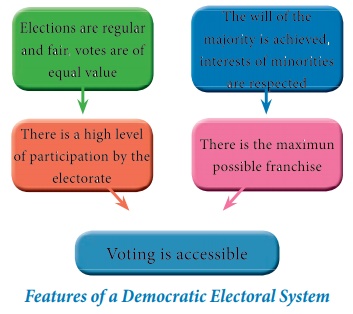Political Science - Meaning and nature of Franchise and Representation | 11th Political Science : Chapter 10 : Election and Representation
Chapter: 11th Political Science : Chapter 10 : Election and Representation
Meaning and nature of Franchise and Representation
Meaning and nature of Franchise and Representation
What is Franchise and Election?
The right to vote in public elections. The word
“Franchise” is of Anglo-French derivation-from Franc, meaning FREE.
An election is the process of voting to choose someone to be their political leader or representative in government.
And what is Representation?
It is nothing but the action of speaking or acting
on behalf of someone or the state of being so represented.
Part XV of the Indian Constitution titled “Elections” is of great importance. The constitution –makers had been anxious to safeguard this political right as an integral part of the constitution itself. It is for this important reason that the subject of elections has been accorded a constitutional recognition in our country.
Although elections were used in Ancient Athens,
Rome and in the selection of Popes and Holy Roman Emperors, the origins of
elections in the contemporary world was in the gradual emergence of
representative government in Europe and North America which began in the 17th
century. In a representative democracy elections are extremely important.
Voting, in elections is the best way to make your voice heard. One fact that
makes elections more important is when political parties try to suppress voting
with the use of laws to disallow people to vote. Election and representation is
the core for the formation of government.
Democratic Electoral System
Let us study the most essential features of a
democratic electoral system. A democratic electoral system can be said to be
one where…

Why do we need Elections ?
Let us try to imagine a democracy without
elections. A rule of the people is possible without any elections if all the
people can sit together every day and take all the decisions. This is not
possible in any large community nor it is possible for everyone to have the
time and knowledge to take decisions in all matters. Let us presume that the
people can resolve these difficulties and such a place do not require
elections. In such case can we call this place a democracy?
How do we find out if the people like their
representatives or not? How do we ensure that these representatives rule as per
the wishes of the people? How to make sure that those whom the people don’t
like do not remain their representatives? This requires a mechanism by which
people can choose their representatives at regular intervals and change them if
they wish to do so. This mechanism is called Election. Therefore, elections are
considered essential in our times for any representative government. Hence in
most democracies, people rule through their representatives.
In an election the voters make many choices:
v They can
choose who will make laws for them
v They can
choose who will form the government and take major decisions
v They can choose the party whose policies will guide the government and law making.
What makes an Election Democratic?
v Everyone
should be able to choose. This means that everyone should have one vote and
every vote should have equal value.
v There
should be something to choose from parties and candidate should be free to
contest elections and should offer some real choice to the voters.
v The
choice should be offered at regular intervals. Elections should be held
regularly after every few years.
v The
candidate preferred by the people should get elected.
v Elections
should be conducted in a free and fair manner where people can choose as they
really wish.
An election is a formal decision making process by
which a population chooses an individual to hold public office. Elections fill
offices in the legislatures, sometimes in the executive and judiciary and for
regional and local government.
Related Topics